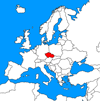
Gesamtdarstellung / Country Report
„Gesellschafts- und steuerrechtliche Rahmenbedingungen des Dritten Sektors in der Tschechischen Republik“
Kommentierte Texte & Links /Annotated Literature & Links
„The third sector and the policy process in the Czech Republic“, Pavol Fric, 2005.
Dieser Text bietet einen guten Überblick über die strukturellen Gegebenheiten des Dritten Sektors in Tschechien. Fric geht auf die historische Entwicklung des Sektors ein und insbesondere auf die Postkommunistische Zeit seit 1989. Er beschreibt eine Unterscheidung zwischen alten und neuen NGOs und den daraus entstehenden sektorinternen Konflikt. Darüber hinaus werden die verschiedenen Tätigkeitsfelder tschechischer NGOs und die Möglichkeitkeiten der Finanzierungen aufgezeigt. Die Hauptprobleme des Sektors liegen laut Fric in der fehlenden langfristigen Finanzierungssicherheit durch staatliche Mittel und in der fehlenden horizontalen Diversifikation der Tätigkeitsfelder von NGOs.
This text provides a comprehensive overview about the structural realities of the third sector in the Czech Republic. While looking at the historical development of the sector Fric particularly focuses on the post communistic period since 1989. He describes the differentiation between old and new non-governmental organizations and the hence resulting conflict within the sector. Furthermore the field of activity of Czech non-governmental organizations and the possibilities of funding are identified. According to Fric the central issues of the sector are long-term financial security resulting from the lack of government funding and the lack of horizontal diversification of the activities of non-governmental organizations.
„EFC COUNTRY PROFILE: CZECH REPUBLIC“, European Foundation Centre, 2011.
Das Länderprofil des EFC behandelt Fragen über die rechtlichen Rahmenbedingungen für Stiftungen, wie etwa die Zwecke, welche durch Stiftungen verfolgt werden dürfen oder gesetzliche Regeln zur Errichtung und Verwaltung einer Stiftung. Darüber hinaus wird die steuerliche Behandlung von Stiftungen erläutert. In diesem Zusammenhang werden Unterschiede bei der steuerlichen Behandlung der Einnahmen aus den verschiedenen Sphären der Mittelakquirierung dargestellt. Schließlich wird die länderspezifische Situation des Spendenrechtes aufgezeigt.
The profiles address issues concerning the legal environment of foundations, such as the purposes that foundations are allowed to pursue, the requirements for setting them up, governance and transparency requirements. The tax treatment of foundations is also discussed, with details on the income tax treatment of the foundation, including income from economic activities and asset management. There is also information on tax incentives for individual and corporate donors, including the issue of cross-border donations.
„USIG Country Information“, ICNL, 2010.
Das USIG Länderprofil liefert einen Überblick über die steuerliche Behandlung von NGOs im jeweils betrachteten Land. Insbesondere steht die steuerliche Behandlung von Spenden im Fokus. Grundsätzlich soll dadurch US-Amerikanischen Spendern erleichtert werden, die zur Abzugsfähigkeit einer Spende an eine im Ausland ansässige Organisation notwendigen Äquivalenz-Bestimmungen feststellen zu können. Die Berichte sind von Lokalen Experten verfasst.
This compilation of country codes and laws is intended to assist grantmakers and their advisors when undertaking equivalency determinations for foreign grantees under IRS Revenue Procedure 92-94. Specifically, this section describes the legal framework of nonprofit organizations (also known as non-governmental organizations or NGO’s) in select countries, along with translations of legislative provisions relevant to an equivalency determination under IRS Revenue Procedure 92-94.
Rechtliche Grundlagen / Legal Sources
![]()
Ausgewählte Landesdaten / Selected Country Data
OECD.
Die OECD bietet unter dem folgenden Link einen Querschnitt aus über 40 verschiedenen Datenbanken an. Die länderspezifischen Daten werden jährlich aktualisiert, außerdem sind Links zu den original Quellen vorhanden.
This statistical profile, updated yearly, is a snapshot of data selected from more than 40 statistical databases available on SourceOECD, our online library. The red ’s in the second column provide links to the sources of the data, where more up-to-date data and longer time series can be found.
IWF, Dissemination standards Bulletin Board / Index of Data Categories.
Unter dem folgenden Link bietet der IWF einen nach Kategorien geordneten Index, welcher aufschlussreiche Daten verschiedener Bereiche zur Struktur des jeweiligen Landes bietet.
With the Bulletin Board the IMF provides an index of categories, delivering data about different fields concerning the structure of a certain country.
CIVICUS, Civil Society Index (Country Report).
The CIVICUS Civil Society Index (CSI) is a participatory needs assessment and action planning tool for civil society around the world, with the aim of creating a knowledge base and momentum for civil society strengthening initiatives. The CSI is initiated and implemented by, and for, civil society organizations at the country level. It also actively involves and disseminates its findings to a broad range of stakeholders including government, donors, academics and the public at large.
CIA, World Factbook, 2010.
Das World Factbook beinhaltet Informationen über die Geschichte, Regierung, Ökonomie, Geographie, Infrastruktur und Internationale Beziehungen von insgesamt 266 Einheiten. Dadurch liefert dieses Länderprofil einen eher allgemeinen Überblick über das jeweilige Land.
The World Factbook provides information on the history, people, government, economy, geography, communications, transportation, military, and transnational issues for 266 world entities. Thus it delivers a rather general overview about the selected country.
